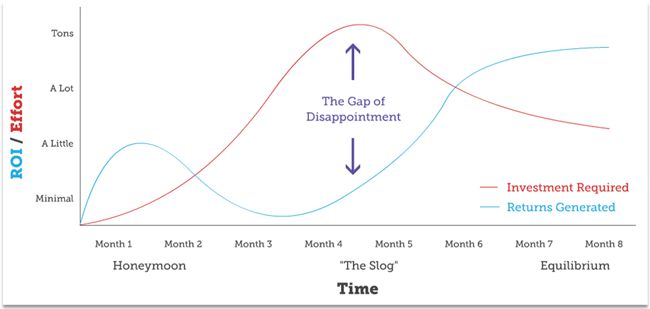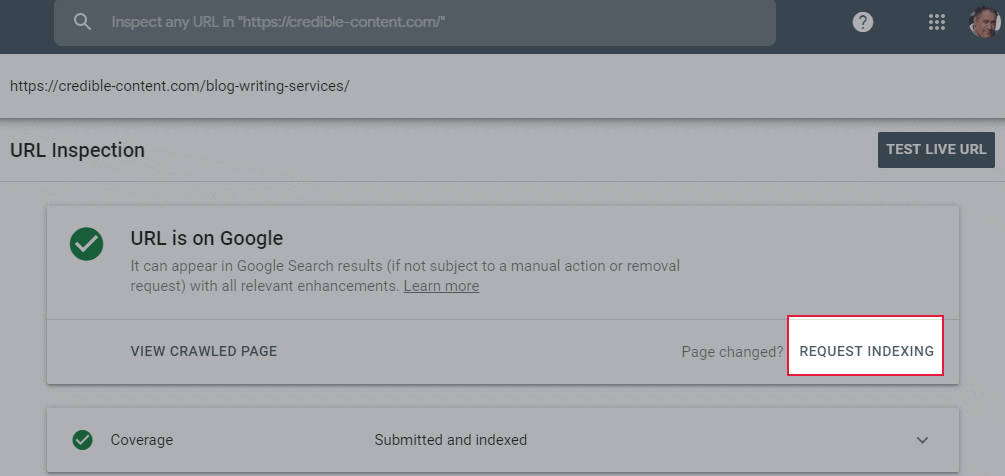Here I will write in the context of content writing. When do you start experiencing the positive results of writing and publishing content on your website or blog on regular basis?
When you are writing content on your own (you are investing time) you are not spending money, but if you have hired a content writer then it is a recurring expense especially when you want to go on publishing content for a few months.
The nature of content marketing, in terms of improving your search engine rankings and generating more business for you, is such that it takes some time before you begin to experience your return on investment.
It’s like doing farming. When you are just about to start farming, if you don’t have land, you buy land, which is an expense. Then you prepare the land for sowing, which involves effort and money. Then you buy seeds. You sow the seeds and take measures that they grow into a healthy harvest. Then you reap the benefits.
When you repeat the sowing and harvesting, your investment and hard work begins to pay. But until then, you must be patient and courageous.
The same happens with content writing and content marketing.
I was inspired to write this post when I came across this graphic. The graphic was prepared by the SEO website Moz.
It shows that when you start investing in content, initially there is euphoria as you see some results. Then, as the search engines begin to figure your content and your competitors, knowingly or unknowingly, begin to catch up, although your costs go on mounting, the results dip.
The graphic shows an area called “The gap of disappointment” and most of the people abandon their content writing and content publishing efforts during this phase when they begin to think that although they have spent a lot of money, the ROI isn’t there. Just when their cost is going to come down and the content writing and content marketing is about to show results, they quit.
The graph shows that it takes around 5 months for things to really kick off. Then, by 7th month, the ROI begins to rise and cost and effort begin to come down and eventually, cost and effort plateau, but ROI keeps rising for a long time before creating a big gap between effort/cost and ROI.
Why content writing and content marketing take a while before beginning to grow your business, compared to conventional advertising?
It takes time to create a presence for yourself even when you use conventional advertising it’s just that, the mental conditioning is such that you don’t realize it.
First, we must make it clear why you want to use content marketing and not conventional advertising. I mean, if conventional advertising is better, why not use it instead of content marketing?
Conventional advertising is instant gratification. You pay for exposure, you get the exposure, and people buy from you. It’s an ongoing process. Unless you are a famous brand, there is always going to be a big gap between advertising expense and ROI, in the negative sense.
Take for example advertising on Google. You pay for every click. Stop paying for clicks and you stop getting traffic, it is as simple as that.
Similarly, you stop advertising, and people can’t see you. You haven’t become a part of their lives. You haven’t kept in touch with them. You haven’t helped them in any other manner. You have simply advertised your product or service hoping that they will come to your website and buy from you.
The combination of content writing and content marketing on the other hand isn’t instant gratification. It is a long-term investment in building and establishing lasting relationships.
Once you have published enough good quality, targeted content, you don’t need to pay for every click Google sends your way. When you have organically improved your search engine rankings, whether you get 10 clicks or 10,000 clicks, or even 10 million clicks, you don’t have to pay.
Content in the context of content marketing doesn’t mean publishing any sort of content just to get visibility. Your content needs to be meaningful, useful and informative. It must solve a purpose. Your prospective customers or clients must feel good when they come across your content on search engines and on social media and social networking websites.
Content marketing means building your brand presence through an emotional connection. People begin to know you. They begin to recognize you for the quality of your content. You don’t need to advertise. They themselves seek you out.
Yes, initially there is a cost. But once you have published enough content return on investment is so huge that compared to that, the money and effort that you spend on writing and publishing content is negligible.
As you can see in the above graph, it takes time. Depending on how much competition you have it can easily take between 3-6 months to get good results and if you can sustain yourself till then, often, there is no looking back.







